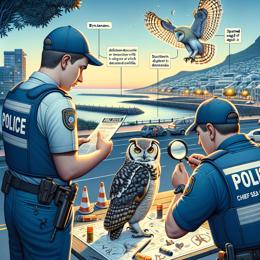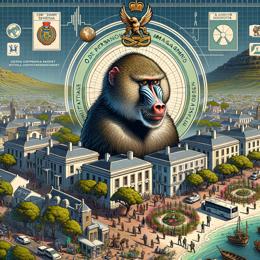Image created by AI
Peaceful Resolution Achieved: Cape Peninsula Baboon Management Moves Forward With New Strategy
The Cape Peninsula Baboon Management Joint Task Team (CPBMJTT), a coalition encompassing SANParks, CapeNature, and the City of Cape Town, has celebrated a significant progression in baboon conservation efforts following the withdrawal of litigation by activists. This collaborative body had been subject to a legal challenge that, while founded in environmental concern, had stalled some of their conservation initiatives.
On December 6, 2024, the plaintiffs, including seasoned activist Ryno Engelbrecht and organizations such as Baboon Matters and Beauty Without Cruelty, formally renounced their legal action in the Western Cape High Court, indicating a noteworthy move towards cooperation over confrontation. This resolution came just in time to reinforce the ongoing implementation of the Baboon Strategic Management Plan. Spearheaded by the CPBMJTT, this plan aims to foster a harmonious co-existence between the region's Chacma baboons and local communities.
In recent developments, the CPBMJTT has effectively rolled out several initiatives, focusing primarily on the essential presence of baboon rangers in sensitive areas. From December 1, 2024, to the end of the year, NCC Environmental Services will supervise these teams through a specific request for quotation process. Then, starting January 1, 2025, a more permanent contractor will continue these efforts, subject to monthly assessments.
A pivotal aspect of these plans is the proposed partnership with the Shark Spotters, a non-profit organization hitherto involved in marine life monitoring. This collaboration is due to be formalized through a Memorandum of Agreement (MoA), which received affirmative backing from the City of Cape Town's Council on December 5, 2024. Subsequent agreements will see both SANParks and CapeNature contribute resources and funding, ensuring a well-rounded and community-integrated approach to baboon management.
Further anchoring community involvement, February 2025 will see the inaugural meeting of the Cape Peninsula Baboon Advisory Group. This body aims to bridge diverse community perspectives with governmental actions, ensuring that all voices are heard in the ongoing discourse surrounding baboon management.
The withdrawal of litigation and these proactive steps reflect a consolidated effort to manage the baboon populations sustainably while minimizing human-animal conflicts. This initiative stands as a testament to the power of dialogue and cooperation in environmental management and sets a precedent for future conservation efforts in South Africa and beyond.










